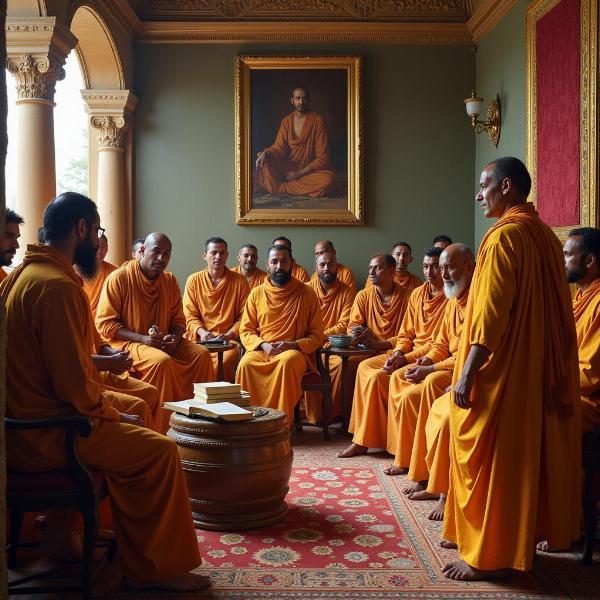The Hindi meaning of courtiers is often a complex topic, encompassing various nuances depending on the historical context and the specific type of court being referenced. Understanding the word “courtiers” requires delving into the cultural and social structures of historical Indian courts, where these individuals played significant roles. This article explores the different Hindi words used to represent “courtiers,” their historical significance, and the evolution of their meaning over time.
Decoding “Courtiers” in Hindi: More Than Just a Word
While there isn’t one single perfect Hindi equivalent for “courtiers,” several words capture different aspects of their roles and positions. These include darbaris (दरबारी), rajpurush (राजपुरुष), and sabhasad (सभासद). Each term carries its own connotations, reflecting the hierarchical nature of the court and the specific duties performed by these individuals. Understanding these distinctions provides a more nuanced understanding of Indian history and culture.
Darbaris (दरबारी): Residents of the Court
Darbaris literally translates to “belonging to the court” or “resident of the court.” This term is broadly used and encompasses anyone residing within the royal palace, including officials, advisors, servants, and even entertainers. It doesn’t necessarily imply a specific rank or duty, simply an association with the royal household.
Rajpurush (राजपुरुष): Officials and Representatives of the King
Rajpurush signifies “king’s man” or “official of the state.” This term refers specifically to individuals holding official positions within the royal administration and carrying out the king’s orders. Rajpurush emphasizes the individual’s administrative role and their direct link to the ruler.
Sabhasad (सभासद): Members of the Assembly
Sabhasad denotes “member of the assembly” or “councilor.” This term refers to individuals who were part of the royal court’s advisory body or assembly. Sabhasad highlights the advisory and deliberative role played by these courtiers.
 Sabhasad in a Royal Assembly
Sabhasad in a Royal Assembly
The Evolving Role of Courtiers in Indian History
The role of courtiers evolved significantly throughout Indian history, influenced by changing political landscapes and societal structures. From the ancient kingdoms to the Mughal empire, courtiers held various responsibilities, from advising the ruler on matters of state to managing the royal household. Their influence often extended beyond the court, impacting the lives of ordinary citizens. Understanding this historical context is crucial for grasping the full meaning and significance of the word “courtiers” in Hindi.
What Did Courtiers Do?
Courtiers played diverse roles, including:
- Advisors: Offering counsel to the ruler on political, economic, and social matters.
- Administrators: Managing the day-to-day affairs of the kingdom.
- Diplomats: Representing the kingdom in interactions with other states.
- Military Commanders: Leading armies and defending the kingdom’s borders.
- Scholars and Artists: Contributing to the cultural and intellectual life of the court.
Conclusion
The Hindi meaning of “courtiers” is best understood through a nuanced exploration of terms like darbaris, rajpurush, and sabhasad. Each word offers a unique perspective on the roles and responsibilities of these individuals within the complex hierarchy of Indian courts. Understanding the historical context and the evolution of these roles is vital for a complete understanding of Indian history and culture. By exploring these nuances, we can appreciate the multifaceted meaning of “courtiers” and their significance in shaping India’s rich past.
FAQ
- What is the most common Hindi word for “courtier”? Darbaris is often the most commonly used term.
- What is the difference between rajpurush and sabhasad? Rajpurush refers to officials carrying out the king’s orders, while sabhasad refers to members of the advisory assembly.
- Did courtiers have any real power? Courtiers often wielded significant influence, both within the court and beyond.
- Were all courtiers wealthy and powerful? Not all courtiers held positions of power or wealth. Some were servants or entertainers.
- What is the historical significance of courtiers? Courtiers played a crucial role in shaping the political, social, and cultural landscape of ancient India.
- Are there any modern-day equivalents of courtiers? While the traditional role of courtiers has largely disappeared, advisors and officials in modern governments fulfill some similar functions.
- Where can I learn more about Indian history and culture? Numerous resources, including books, museums, and online platforms, offer in-depth information about Indian history and culture.
Meaning-Hindi.in is your trusted partner for all your Hindi translation needs. We offer a comprehensive range of translation services, including business and commercial document translation, certified and legal document translation, technical and user manual translation, website and localization services, educational and academic document translation, and specialized translations in various fields. Our team of expert Hindi linguists ensures accurate and culturally sensitive translations, tailored to your specific requirements. Contact us today at [email protected] or +91 11-4502-7584. Meaning-Hindi.in is dedicated to bridging the language gap and facilitating effective communication across cultures.